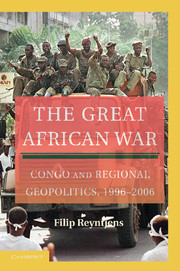Book contents
- Frontmatter
- Contents
- Acknowledgements
- List of Maps
- Introduction
- 1 A Region in Turmoil
- 2 The ‘War of Liberation’
- 3 Massacre of the Rwandan Refugees
- 4 The Fall of the Mobutist State
- 5 Congo: Waiting for Another War
- 6 Impasse in Rwanda and Burundi
- 7 ‘The First African World War’
- 8 Negotiating the Transition
- Conclusion
- Appendix 1 Sources on the killings of Rwandan refugees in early 1997
- Appendix 2 Chronology
- Appendix 3 List of abbreviations
- References
- Index
Conclusion
Published online by Cambridge University Press: 18 December 2009
- Frontmatter
- Contents
- Acknowledgements
- List of Maps
- Introduction
- 1 A Region in Turmoil
- 2 The ‘War of Liberation’
- 3 Massacre of the Rwandan Refugees
- 4 The Fall of the Mobutist State
- 5 Congo: Waiting for Another War
- 6 Impasse in Rwanda and Burundi
- 7 ‘The First African World War’
- 8 Negotiating the Transition
- Conclusion
- Appendix 1 Sources on the killings of Rwandan refugees in early 1997
- Appendix 2 Chronology
- Appendix 3 List of abbreviations
- References
- Index
Summary
According to Lemarchand, political, economic and social exclusion are the principal dimensions necessary for understanding the dynamics of domestic and interstate violence in the region. ‘[T]he central pattern that recurs time and again is one in which ethnic polarization paves the way for political exclusion, exclusion eventually leading to insurrection, insurrection to repression, and repression to massive flows of refugees and internally displaced persons, which in turn become the vectors of further instability’. He adds that ‘[w]here ethnic fault lines cut across national boundaries, conflict tends to spill over from one national arena to the next’. This bottomline analysis perfectly captures the dynamics at play in the Great Lakes region in the 1990s. The exclusion of the Rwandan Tutsi after 1959 led to invasion by the RPF, which in turn led to anti-Tutsi violence and eventually genocide. After the RPF's victory, scores of Hutu left for Zaire, from where they attempted to recapture power. Transboundary ethnic alliances exacerbated the conflict, which escalated to become a regional war that ignored national borders. The current exclusion of Hutu (and indeed many Tutsi) in Rwanda may well cause a similar scenario in the years to come. The relative regional peace is probably a lull in the Rwandan civil war, but not its end.
In fact, Lemarchand explains one of the paradoxes appearing in this book, namely that the smallest country in the region has played such a decisive role. Without the lead taken by Rwanda, the ‘AFDL rebellion’ would not have taken place, and Kabila would not have replaced Mobutu.
- Type
- Chapter
- Information
- The Great African WarCongo and Regional Geopolitics, 1996–2006, pp. 279 - 286Publisher: Cambridge University PressPrint publication year: 2009



